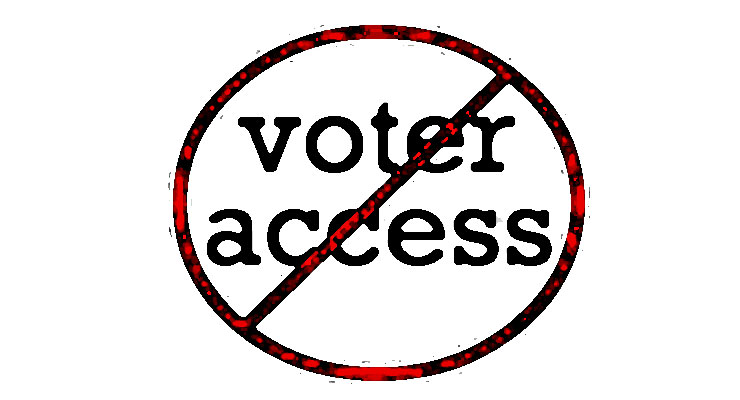
The word frivolous appears liberally in American law and federal court rules. FRCP Rule 11 provides that sanctions can be doled out to those who make “frivolous” filings in federal court. Unfortunately, there is no standard for what is frivolous and what is not, and someone making a new argument that expands disability rights can be slapped with sanctions by an aggressive, hostile, discriminating judge.
Most people with disabilities wanting to run for office but needing ADA accommodations will run into resistance from the state election authority. In my experience, these bodies have never given anyone accommodations before, and this forces a disabled person to sue in federal court.
The problem here is that disabled people are often poor as well as disabled, and so they seek in forma pauperis (IFP) status in order to proceed with their court cases without fees. This status under 28 U.S.C. § 1915(e)(2)(B)(i) again has a provision that allows a court to deny IFP status if the judge thinks the case is “frivolous” or “malicious.”
I have never met a frivolous ADA case, but I have seen federal judges rip apart the ADA, denying relief with bizarre and old doctrines so that the purpose of the ADA is defeated using the word “frivolous.”
Federal judges also defend their own discrimination by calling any complaint against their bad behavior “frivolous.” Saying the person complaining is making a frivolous argument is generally a weapon of choice for judges who cannot defend their actions. The word frivolous appears six times in the judicial complaints document of the Seventh Circuit U.S. Court of Appeals. It is obvious from a judicial complaint system that focuses so much on the potential abuses of those who complain that judges put this system in place to protect themselves and they can call any complaint frivolous, no matter how important and serious the complaint is.
I, for instance, complained because the 7th Circuit hired one of the people I was suing on appeal at the 7th Circuit. It was dishonest on the part of the Court and I am suing the United States for it. Straw v. United States, 18-5247 (D.C. Cir.)
I broke my legs and pelvis driving to the Indiana Supreme Court to work in 2001 due to a reckless driver hitting me head on at 60 mph. Since then, the Indiana Supreme Court found out about my poisoning disability from Camp LeJeune and discriminated against me on that basis for over a decade. I was forced to reveal my mental disability before people with whom I worked and then I was forced to reveal disability information quarterly, which violated the ADA, Title II. However, when Tennessee v. Lane, 541 U.S. 509 (2004) was decided, I convinced the Indiana State Board of Law Examiners to drop all of the reporting. This was my first victory against that former employer based on the ADA, Title II.
But when I made another ADA complaint in 2014, the ADA Coordinator for the Court refused to help me and used the confidential information in my complaint to file a disciplinary complaint against me attacking 4 ADA-related federal lawsuits.
It was outrageous, and Brenda F. Rodeheffer, the ADA coordinator for the Court at that time, also gave information about her complaint to a lawyer outside the Court to attack me personally. The Virginia State Bar called it a “drive-by shooting.” The VSB also said that I met the clear and convincing standard to show I did not deserve discipline and so would not be disciplined in Virginia.
The first of the four ADA cases the ADA coordinator attacked involved protecting the parenting time rights of a disabled father when an Indiana trial court stripped those rights from him. Both the National Council on Disability and the American Bar Association agreed with my position, but I was ridiculed by the federal judge.
The U.S. Department of Justice and the U.S. Department of Health and Human Services also have a strong position on this topic:
“Discriminatory separation of parents from their children can result in long-term negative consequences to both parents and their children.”
Judge “Moody” was wrong. All of these agencies that deal with disability and parental rights agreed with me, not the discriminating state court or the defendant or counsel.
Another of the four cases concerned my ADA work getting a local government to identify the large lack of handicap parking where I lived. Businesses in the Northwest Suburbs of Chicago often pay little heed to disability access and will pile all the snow in their parking lot into the handicap space. This photo is from a Payless Shoe Source in Schaumburg in 2015 that did precisely this:

About 150 handicap spaces were missing. Instead of welcoming my influence, the local newspaper printed a letter to the editor saying I was committing extortion, which of course was not true and later the author of that letter settled with me, but the newspaper would not. So, I sued the newspaper and the lawyer for the newspaper sent me a letter demanding that I give access to my Medicare claims account to the newspaper so it could look at my medical information and claims. I sued because this was such a huge violation of my privacy. Medicare said the lawyer was wrong to ask for that information and wrong to make financial threats so that I would give it up, and that I should never give my Medicare claims information to him or his newspaper client.
The federal judge, dead now, said my case was frivolous. It was not and anyone wanting to know the whole picture can read my last filing in the case. Straw v. Locke Lord LLP, 1:14-cv-1420 (N.D. Ill.) (Dkt. 42). Locke Lord LLP, the firm representing the newspaper, was involved in what the Chief Judge of the 7th Circuit called, “a hornet’s nest of ethical violations.” But somehow, when I accuse that same firm of violating me and my privacy rights, I am accused of doing something frivolous. The law firm for Locke Lord LLP on appeal formerly employed the federal trial judge, Milton Shadur. This is dirty pool, but quite normal in the 7th Circuit.
After the nation-wide scandal regarding the Law School Admission Test, I wanted the ABA to start tracking disability in law school admissions because there are not enough disabled lawyers and this affects me and my rights directly. I sued the ABA. The judge dismissed, but he did not call my case frivolous, only that I lacked standing. In an email earlier this year, the Harvard Law School admissions office confirmed to me that they now collect disability statistics and that Harvard considers this “an important topic.” Other top 50 law schools have also confirmed that they now collect disability statistics. These schools were my defendants in 2014 and I am glad to see these changes in 2018.
Indiana used that 2014 ABA case against me, claiming it was frivolous even when the federal judge did not say so.
When I tried to sue the Indiana Supreme Court by adding it as a defendant in my case against a former client who wanted me to compensate her because I would not violate the ethics code, the judge said my filing was frivolous, but it was not. The ADA coordinator gave my former client her disciplinary complaint based on my ADA complaint and this was retaliation. My former client wanted me to file a lawsuit for her even though I said specifically in my representation agreement that I would not do this. If I had filed a federal lawsuit without her explicit approval, I would have committed an ethical violation. So, I was sued for malpractice for not committing malpractice. The ADA coordinator loved this case because she got to help my former client attack my competency, and that was part of the ADA Coordinator’s plan. My own insurance lawyer said that this client of mine had no damages. She was not fired. She got raises the next three years, her abuser left employment, and she said she wanted to retire from that employer, she was so happy there. All of this was under oath in a deposition. But the Indiana Supreme Court stuck its thumb on the scales by giving my former client its disciplinary complaint against me that had information I gave in confidence to the ADA coordinator.
These four cases were called “frivolous” but I received not a single day of suspension, not a penny in fines, and not even a private reprimand. Indiana took these ADA cases and retaliated against me for bringing them and I have now been suspended for over 590 days. In re Straw, 68 N.E.3d 1070 (Ind. 2017). The Indiana Supreme Court was so sensitive to being labeled an ADA violator that the Court took special note of my lawsuit against it to say that the Indiana Supreme Court was not committing discrimination but punishing incompetence. This violates the ancient maxim that nemo judex in causa sua, which means you cannot judge your own case. But that is exactly what the Indiana Supreme Court did. They judged their own ADA violations from my August 2014 complaint and then retaliated against me for filing 4 ADA-related lawsuits.
The problem with this is that the ADA prohibits retaliation and the U.S. DOJ regulations for Title II state that no entity or person may retaliate against any ADA case no matter what the outcome. I can only assume that “no matter what the outcome” includes some judge saying the case was frivolous, with no standard for that term.
The lesson here is that dishonest courts with disability bigots as judges will use the word frivolous to punish anyone who uses the ADA to remove discrimination from our society. Congress specifically states in the ADA that eliminating discrimination is the purpose of the Act. 42 U.S.C. 12101(b)(1) I am the poster boy for being injured for using the ADA. However, Congress has included every state and every state court in its coverage. 42 U.S.C. § 12132. Tennessee v. Lane specifically included state courts. Even when state governments claim they are protected by sovereign immunity, they are wrong under the ADA and they are wrong under the ADA Title II regulations. Even the Title II Technical Assistance Manual answers the question: “Is a State immune from suit under the ADA? No. A State is not immune from an action in Federal court for violations of the ADA.”
The 7th Circuit did not like my aggressive use the ADA and sided with Indiana regarding its abusive suspension of my law license without any proper hearing and 4 U.S. District Courts in the 7th Circuit followed suit even when their original cases did not impose any discipline. These federal courts imposed discipline because Indiana did, and Indiana imposed discipline that these federal courts would not impose on their own, but merely said the word “frivolous.” No federal court would protect me. Straw v. Indiana Supreme Court, et. al., 17-1338 (7th Cir. 7/6/2017).
I am truly fortunate that the Virginia State Bar saw through this ungodly mess of state court discrimination infecting the federal courts and said I met my clear and convincing evidence standard to show I did not deserve discipline. However, none of the courts in the Midwest would respect the VSB hearing or its ORDER. I have the adjudication and the only place that gave me a proper hearing was Virginia. End of story.
So, the 7th Circuit started denying me every time I made an appeal over the past 4 years. They hired one of my appellees, the Indiana hearing officer. Then, after hiring him and favoring him in my appeal, I was attainted. I could not get justice from this Court of Appeals. About 16 times I was denied. The Court accused me of filing a frivolous judicial complaint (about hiring my appellee) and imposed a $1,000 bond condition before I could make any further complaint, knowing that I could not pay this. They knew it because I use the courts in forma pauperis, IFP.
I was, therefore, stripped of the right to complain. But I kept filing cases and appealing them. So, the Court has started threatening me with being totally banned from the federal courts in the 7th Circuit. This language of stripping my constitutional right to access the courts appeared in two cases. The first case was the 7th Circuit denying the right to be a Title II tester so that local governments would be forced to clear the snow from the sidewalks so disabled people would not have to travel in the street amongst the cars, risking their very lives. Straw v. Streamwood, et. al., 17-1867 (7th Cir.) A U.S. Supreme Court case supported my position 100%, as did the Federal Highway Administration, but it does not matter how many Supreme Court cases I have supporting me; I lose because it’s me as the appellant and it is a bevy of hostile judges on the 7th Circuit, judges who are incapable of granting me justice. The second case was me demanding the First Amendment right to have my 7th Circuit law licenses rescinded. Two U.S. District Courts agreed that I have this right, but the 7th Circuit called my appeal “frivolous.” Straw v. U.S. District Court, 18-2192 (7th Cir. 2018)
Obviously, no matter how right I am, I am a person they want to punish, to deny justice, to label frivolous no matter what I say. This is why I am suing the United States for what the 7th Circuit has done. Straw v. United States, 18-5247 (D.C. Cir.). A person can only take so much and then they must realize using courts that discriminate is futile. One must go elsewhere.
FRIVOLOUS VERSUS LAW REFORM
The opposite of “frivolous” is “law reform” and when someone advances a new interpretation of the ADA so that elimination of discrimination can happen, it should never be considered frivolous.
No ADA case should ever be considered frivolous and every time a disabled person with little or no resources asks for IFP status, it should automatically be granted at the trial court and appellate level. The PACER system (www.pacer.gov) that allows a person to track what is happening in the docket of cases should be free to anyone with IFP status in any case. But it’s not free now and those charges can rack up to hundreds of dollars and a real burden on a poor person trying to protect their rights. Judges should make this free rather than saying a disabled, poor person can call the clerk for information. Rich defendants don’t have to ask because they can pay these PACER fees. Courts need to stop discriminating in the provision of court services. This includes making PACER free for IFP litigants.
IFP status is important because it guarantees the U.S. Marshal will serve the summons and complaint for the poor (and disabled) person. FRCP Rule 4(c)(3). The IFP statute also makes very clear that the court and its staff have the duty to provide service of the complaint and summons. 28 U.S.C. § 1915(d).
The final lesson is that disabled people who want to run for office may need to venture into an environment that is hostile to them, prone to labeling disabled people’s cases as “frivolous,” and ready to shut down democratic rights for disabled Americans in a heartbeat. I would say not to rely on any lawyer because most lawyers know how quickly a judge will label an ADA case frivolous and lawyers are at risk of losing their license if anything they file is deemed frivolous. Look at what happened to me.
Remember, frivolous is the word that judges and lawyers use to shut down disability rights, including the right to vote and the right to be a candidate, not to mention the right to walk on a sidewalk without it being full of snow and ice piles. Frivolous is the word used to punish, to deny, to discriminate.

Andrew Straw says
Please see my full rebuttal of the Indiana Supreme Court discipline:
https://InReStraw.andrewstraw.com